To enhance your home's security, consider investing in a reliable home alarm system. Motion detectors, glass breakage alarms, and combined systems offer extensive coverage. Choose between wired systems for signal reliability and wireless setups for easy installation. Smart home integration, like remote management and live video feeds, adds convenience and functionality. Look for features like motion detection customization and prompt alarm notifications to guarantee you're always connected. Installation and maintenance are straightforward but require regular checks to verify everything's running smoothly. With the right system, you can protect your home and enjoy peace of mind, knowing there's more to explore.
Key Takeaways
- Combined systems offer comprehensive coverage by integrating motion detectors and alarm monitoring for increased reliability.
- Wired alarms provide consistent communication and reliability, reducing the risk of signal interference.
- Smart home integration enhances reliability through features like remote management and live video feeds.
- Regular maintenance, such as monthly system tests and software updates, ensures the reliability of home alarms.
- User-friendly installation and training enhance confidence in the reliable operation of home alarm systems.
Types of Home Alarm Systems
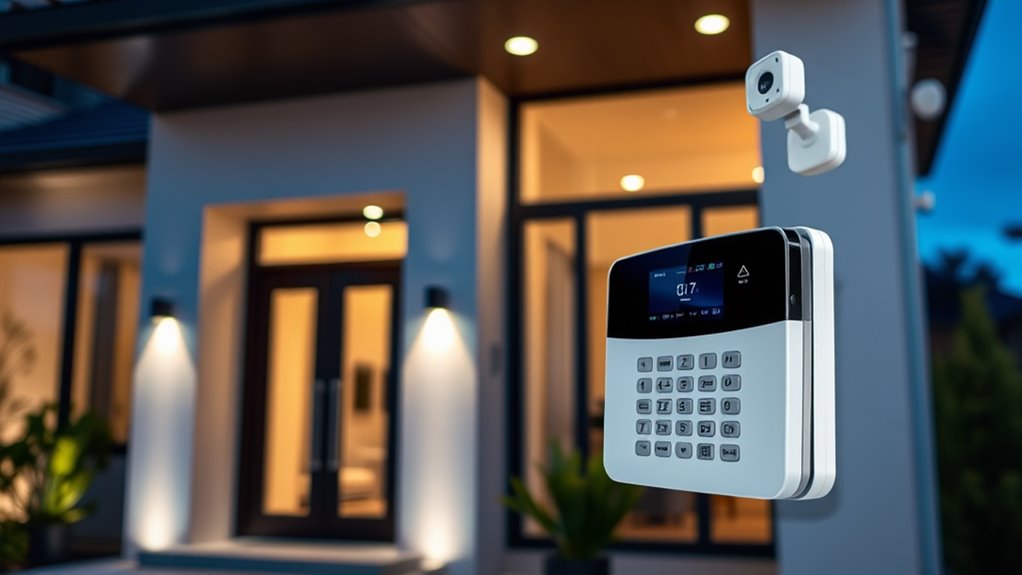
When it comes to protecting your home, choosing the right alarm system is vital. There are various types of home alarm systems to take into account, each with unique features to suit your needs. One popular option includes systems with motion detectors. These devices sense movement and trigger an alert when unexpected activity is detected. This makes them ideal for covering areas like hallways or entry points, ensuring you know when someone enters uninvited. You might also consider a dual-function alarm like the 2n1 Personal Burglar Alarm, which can act both as a personal alarm and a burglar deterrent.
Another key element in home alarm systems is alarm monitoring. With this feature, your system is connected to a monitoring center that actively oversees your home's security. If an alarm is triggered, the monitoring service is alerted, and they can promptly contact you and emergency services if necessary. This provides an extra layer of protection and peace of mind, knowing someone's always looking out for your safety.
Consider adding a Glass Breakage Alarm to enhance your home's security, as it detects vibrations from glass impact or breakage and emits a loud 100dB siren.
Examine systems that combine both motion detectors and alarm monitoring for thorough security coverage. By evaluating the different types of alarm systems and understanding how their features can work together, you can make an informed decision to keep your home safe.
Benefits of Alarm Systems
In addition to enhancing your home's security, alarm systems offer peace of mind that can't be overstated. Knowing your home is protected against potential threats helps you sleep better at night and reduces stress during the day. When you have an alarm system, you're not just investing in home safety; you're investing in your family's well-being and your own peace of mind. A personal alarm can feature multiple functions such as a flashlight and door/window alarm, adding versatility to your security toolkit. Alarm systems deter potential intruders, as the mere presence of an alarm acts as a strong deterrent against break-ins. Criminals are less likely to target homes with visible alarm systems, which notably reduces the chance of a break-in. This proactive approach to home safety means you can focus on enjoying your life without constantly worrying about potential threats. Moreover, alarm systems often include features like smoke and carbon monoxide detectors, providing an additional layer of protection. These features alert you to dangers that mightn't be immediately apparent, ensuring that you can act quickly in an emergency. For example, a Door Stop Alarm can be used to block door openings and alert you to intrusions with its 120dB alarm, enhancing security in various settings.
Wired vs. Wireless Alarms
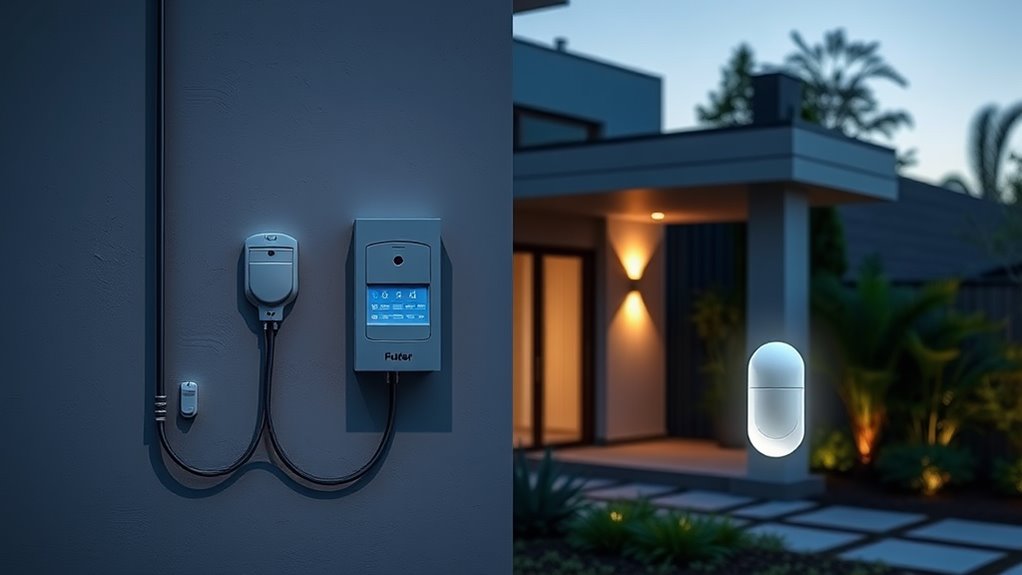
Choosing between wired and wireless alarm systems can seem intimidating, but understanding their differences helps simplify the decision.
Wired alarm systems are typically known for their signal reliability. Since they're hardwired into your home, they're less susceptible to interference from other electronic devices. This guarantees consistent communication between the control panel and sensors.
However, the installation process can be more complex. Running wires through walls and ceilings might require professional help, which can increase installation time and costs.
On the other hand, wireless alarm systems offer a more straightforward installation process. You can often set them up yourself without needing to drill holes or run cables throughout your home. This makes them an attractive option for renters or those who prefer a DIY project.
Although they've come a long way regarding signal reliability, they can occasionally experience interference, particularly if you live in an area with many other wireless signals. Regularly checking and changing batteries is also necessary to maintain consistent operation.
For those interested in pet safety or behavior correction, the Electronic Dog Trainer with No Shock Technology offers a humane way to manage pets without causing harm.
Ultimately, the choice between wired and wireless systems boils down to your priorities: do you value signal reliability or ease of installation?
Weigh these factors to find the best fit for your security needs.
Smart Home Integration
Embrace the future of home security with smart home integration, adding convenience and control to your alarm system. By incorporating smart technology, you can manage your home's security from anywhere using your smartphone or tablet.
Imagine receiving instant alerts if your alarm is triggered or accessing live video feeds to check on your property while you're away. This level of connectivity isn't just about peace of mind; it's about giving you the power to act swiftly in any situation.
Home automation takes this a step further, enabling you to synchronize your alarm system with other smart devices.
Picture your lights turning on automatically if the alarm is tripped, deterring intruders and alerting neighbors. You can even program your security cameras to start recording as soon as a sensor is activated. With these capabilities, your home becomes an integrated ecosystem where each component works in harmony.
Smart home integration also simplifies everyday routines. Set your alarm to arm itself when you lock the front door or disarm when you arrive home.
You're not just getting an alarm system; you're investing in a smarter, safer, more responsive environment that adapts to your lifestyle.
Features to Look For
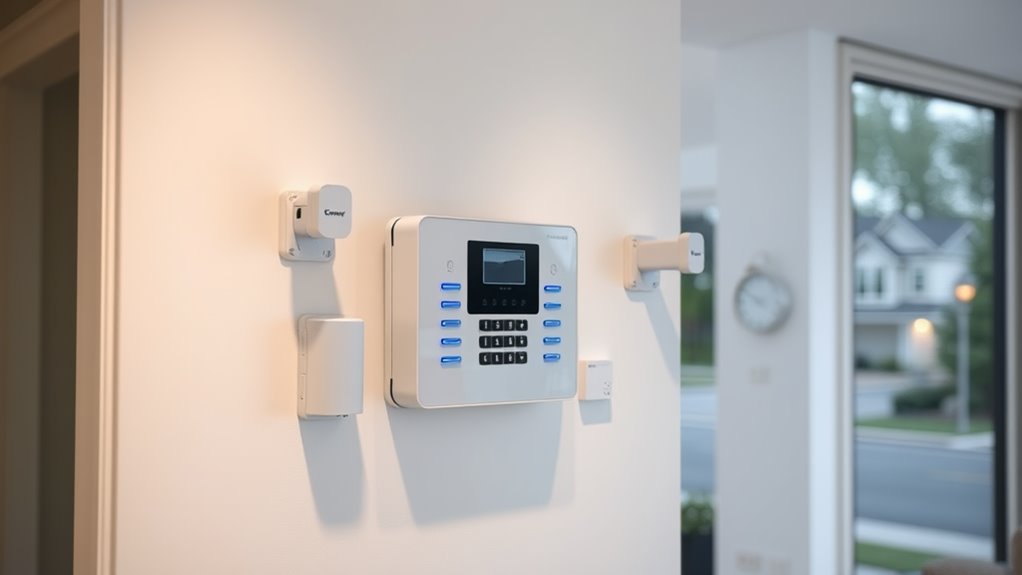
When selecting a home alarm system, you should frequently consider several key features to assure it meets your needs. One essential feature is motion detection. This technology helps identify unauthorized movement within your property, providing an extra layer of security.
Look for systems that offer adjustable sensitivity levels to prevent false alarms from pets or other harmless movements. The ability to customize this feature guarantees the alarm only activates under genuine circumstances, giving you peace of mind.
Another critical feature is alarm notification. It's crucial to choose a system that promptly alerts you and, if possible, the authorities when an alarm is triggered.
Notification methods can vary from text messages and phone calls to push notifications on a dedicated app. Having multiple alert options guarantees you're always informed, no matter where you are.
Additionally, consider the ease of installation and user-friendliness of the system. A straightforward setup process and intuitive interface can save you time and frustration.
Finally, assure the system offers reliable connectivity, whether through Wi-Fi, cellular, or both, to maintain consistent communication and functionality.
Choosing the Right System
Selecting a home alarm system with the right features is only part of the equation; understanding how to choose the right system tailored to your specific needs is equally important.
Start by evaluating your security needs. Do you require simple door and window sensors, or do you need advanced features like motion detectors and surveillance cameras? Knowing your priorities helps narrow down choices considerably.
Next, consider system compatibility. If you have existing smart home devices, it's essential to make sure the new alarm system integrates seamlessly. Many modern systems offer compatibility with popular smart home hubs, allowing for centralized control. This integration can simplify your life by letting you manage security alongside other smart functionalities.
Research potential systems thoroughly. Look for user reviews and expert opinions to understand the system's reliability and customer satisfaction. Pay attention to any recurring issues or concerns that might affect your decision.
Don't forget about scalability. As your security needs change over time, you may want to expand your system. Choose a system that allows for easy upgrades and additions.
Installation Tips and Tricks
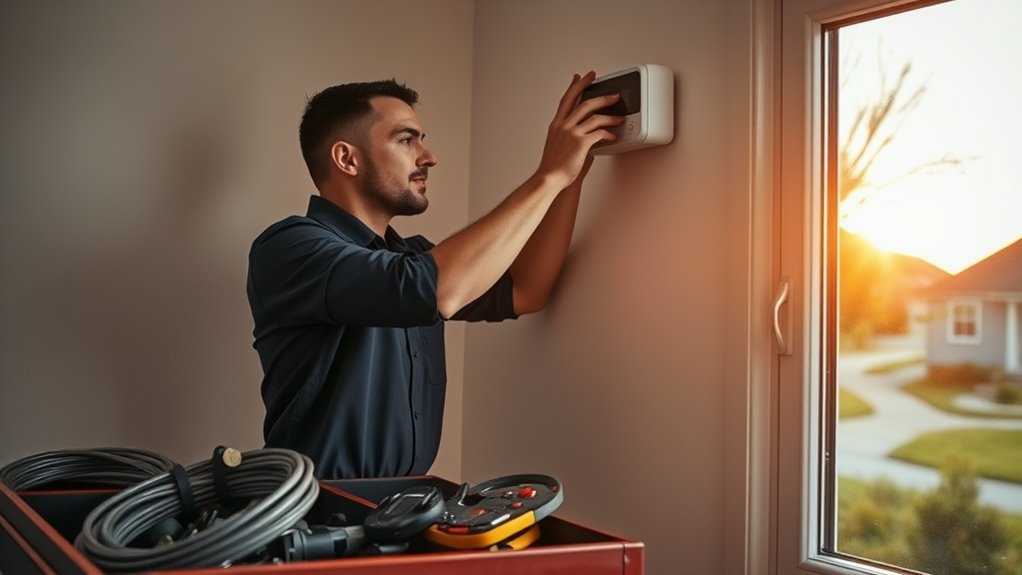
To get the most out of your new home alarm system, proper installation is vital. Whether you opt for a DIY installation or hire a professional, guarantee the system placement covers all vulnerable entry points.
Pay attention to wiring considerations; if you're doing it yourself, double-check connections to avoid malfunctions later. For wireless systems, guarantee strong signal reception throughout your home.
Consider environmental factors during installation. For example, avoid placing sensors near heat sources or drafty windows as these can trigger false alarms.
Customize your system to fit your specific needs, such as adding extra motion detectors or cameras in high-risk areas.
After installation, conduct thorough alarm testing. Walk through your home and trigger sensors to guarantee everything works as expected. This will help you identify any adjustments needed for ideal performance.
Don't skip user training—familiarize yourself with the system's features and guarantee everyone in your household knows how to operate it. This step is vital for effective security.
Maintaining Your Alarm System
Keeping your home alarm system in ideal condition is essential for guaranteeing ongoing security. To maintain your system effectively, focus on alarm system maintenance and conduct regular system checks.
Start by testing your system monthly. This guarantees all components, including sensors and alarms, function correctly. Follow the manufacturer's instructions for testing procedures, and if you notice any issues, address them immediately.
Check the power supply regularly. Confirm backup batteries are charged and ready to take over if the main power fails. Replace batteries annually, or as recommended by the manufacturer, to avoid unexpected failures.
Clean your sensors and cameras to prevent dust or debris from interfering with their operation. A soft cloth and gentle cleaning solution work well for this purpose.
Inspect your system for physical damage. Look for frayed wires or loose connections, which could compromise your system's effectiveness. If you identify any damage, contact a professional for repairs.
Additionally, keep your alarm system's software updated. Software updates often include security patches that protect against new threats.
Cost Considerations
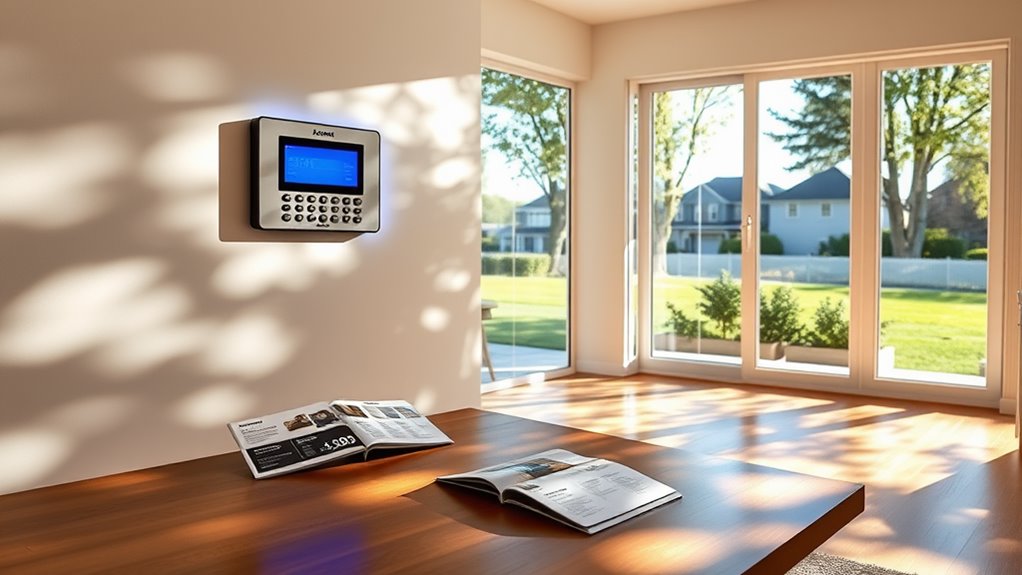
When considering a home alarm system, it's important to weigh the costs involved. You want to make certain that your investment aligns with your financial situation while providing the security you need.
Start with budget planning by evaluating how much you can comfortably spend without straining your finances. Consider both the upfront costs and any recurring fees, such as monthly monitoring charges. It's vital to find a balance between affordability and effectiveness, so don't rush your decision.
Look into insurance discounts that may come with installing a home alarm system. Many insurance providers offer reduced premiums for homes equipped with security systems, which can offset some of the costs. Check with your insurance company to see how much you could save, as these discounts can vary widely.
Additionally, consider the potential long-term savings from preventing theft or damage with a reliable alarm system. While the initial investment may seem significant, the peace of mind and protection you gain is invaluable.
Keep in mind that a well-protected home could also maintain or increase its value over time. By carefully planning your budget and exploring savings opportunities, you can make a smart choice that protects your home and your wallet.
Frequently Asked Questions
How Do Home Alarm Systems Handle False Alarms?
When you encounter false alarms, alarm systems use false alarm prevention methods to minimize triggers. They implement alarm response protocols, notifying you or authorities only after verifying suspicious activity, ensuring genuine threats are addressed efficiently.
What Steps Should Be Taken if an Alarm Is Triggered While on Vacation?
If your alarm's triggered on vacation, rely on emergency contacts to check your home. Make sure they're informed of your travel dates and system codes. Vacation tips include pre-setting alerts on your phone for immediate updates.
Can Pets Trigger Home Alarm Systems, and How Can This Be Prevented?
Yes, pets can trigger alarms. You can prevent this by adjusting motion detector settings. Use pet sensitivity settings to minimize false alerts, ensuring your system accurately distinguishes between pet movements and potential intruders.
Are There Home Alarm Systems Specifically Designed for Renters?
Renter-friendly options offer simple setup and swift security. You can find systems that prioritize portability. Utilize mobile monitoring to maintain control from anywhere. Don't worry about complicated installations or contracts; these systems cater to your needs.
How Do Home Alarm Systems Work During Power Outages?
During power outages, your home alarm system stays operational using battery backup. It guarantees sensor reliability by maintaining continuous monitoring. You won't have to worry about security lapses, as the system automatically switches to battery power.




